
How to Keep Your Mobile Home Cozy Without a Furnace
As a mobile home owner, I know the challenges of staying warm during the winter months without a furnace. The thought of shivering in my home while the temperature drops outside is enough to send shivers down my spine. That’s why I’ve spent years researching and experimenting with different ways to heat my mobile home without a furnace. In this article, I’ll share my tips and expert advice on how to keep your mobile home cozy and comfortable, even on the coldest nights.
Before we dive into the details, it’s important to note that there are safety considerations when heating a mobile home without a furnace. Always ensure proper ventilation to prevent carbon monoxide buildup. Never leave heaters unattended, and keep them away from flammable materials. With these precautions in mind, let’s explore the various ways to warm up your mobile home.
Electric Space Heaters
Electric space heaters are a popular and affordable option for heating a mobile home. They come in various sizes and wattages, so you can choose the one that best fits your space and heating needs. However, it’s important to avoid using too many electric heaters at once, as this can overload your electrical system.
When using electric space heaters, place them strategically to maximize heat distribution. Keep them away from furniture and curtains to prevent fire hazards. Additionally, use tip-over safety switches to prevent overheating and accidental fires. Consider models with built-in thermostats to regulate the temperature automatically.
Gas Heaters
Gas heaters provide more efficient heating than electric heaters, but they require proper installation and ventilation. If you don’t have experience working with gas appliances, it’s best to hire a qualified professional for installation. Gas heaters emit carbon monoxide, so ensure adequate ventilation to avoid health hazards.
Types of gas heaters include wall-mounted units, freestanding stoves, and space heaters. Wall-mounted units offer a more permanent solution, while freestanding stoves and space heaters provide portable heating options. Choose a heater with a BTU rating appropriate for the size of your mobile home. Follow the manufacturer’s instructions for safe installation and operation.
Wood-Burning Stoves
Wood-burning stoves provide a traditional and cozy way to heat a mobile home. However, they require a chimney and proper ventilation to prevent smoke buildup and carbon monoxide poisoning. If you have a fireplace, you can insert a wood-burning stove to utilize the existing chimney. Keep a fire extinguisher nearby for emergencies.
To use a wood-burning stove safely, burn only seasoned firewood and never leave the fire unattended. Clean the stove regularly to prevent creosote buildup, which can cause chimney fires. Install a carbon monoxide detector near the stove for added safety.
Pellet Stoves
Pellet stoves offer a cleaner and more efficient alternative to wood-burning stoves. They burn compressed wood pellets, which are fed into the stove automatically. Pellet stoves require electricity to operate, but they produce less smoke and ash than wood-burning stoves.
When choosing a pellet stove, consider the BTU rating and the size of your mobile home. Ensure proper ventilation and follow the manufacturer’s instructions for installation and operation. Keep a supply of wood pellets on hand to avoid running out during cold weather.
Portable Propane Heaters
Portable propane heaters are a convenient option for spot heating small areas, such as bedrooms or bathrooms. They are easy to use and provide instant heat, but caution must be exercised due to the potential for carbon monoxide buildup.
Use portable propane heaters in well-ventilated areas and never leave them unattended. Follow the manufacturer’s instructions for safe operation and maintenance. Ensure the heater is equipped with safety features such as tip-over switches and oxygen depletion sensors.
FAQ on Heating a Mobile Home Without a Furnace
Q: What are the most energy-efficient ways to heat a mobile home?
A: Gas heaters and pellet stoves are more energy-efficient than electric heaters. Wood-burning stoves can also be efficient if used properly.
Q: What safety precautions should I take when heating a mobile home without a furnace?
A: Ensure proper ventilation to prevent carbon monoxide buildup. Never leave heaters unattended and keep them away from flammable materials. Use safety switches and detectors to prevent overheating and fires.
Q: How can I reduce heating costs?
A: Insulate your mobile home properly to minimize heat loss. Use curtains and blinds to keep the heat in. Consider using programmable thermostats to regulate the temperature when you’re away or sleeping.
Conclusion
Heating a mobile home without a furnace requires careful consideration of safety and efficiency. By following the tips and expert advice outlined in this article, you can keep your mobile home cozy and comfortable throughout the winter months.
If you have any experience or tips on heating a mobile home without a furnace, please share them in the comments below. I’d love to hear from you and learn from your insights.